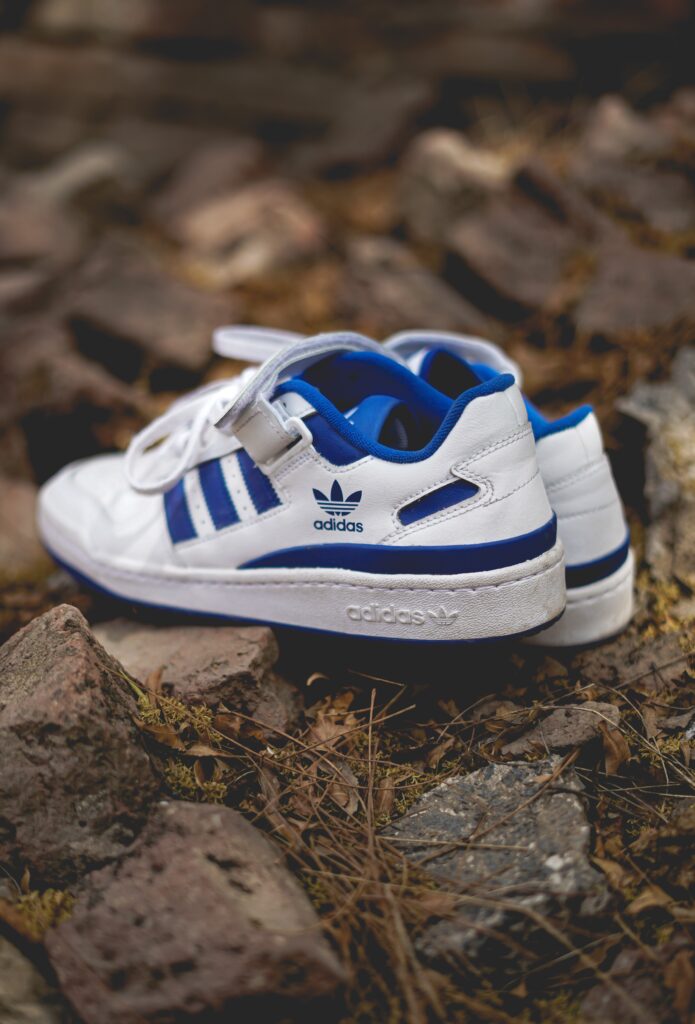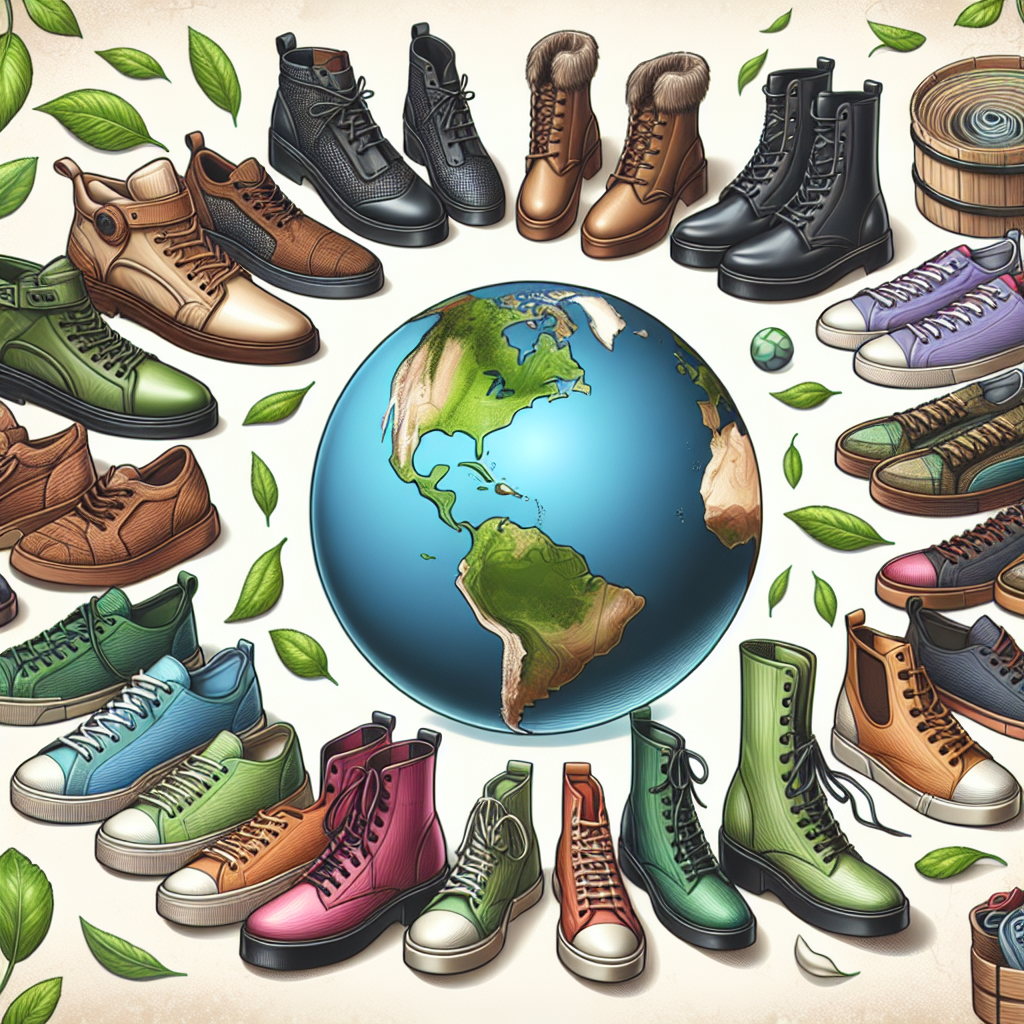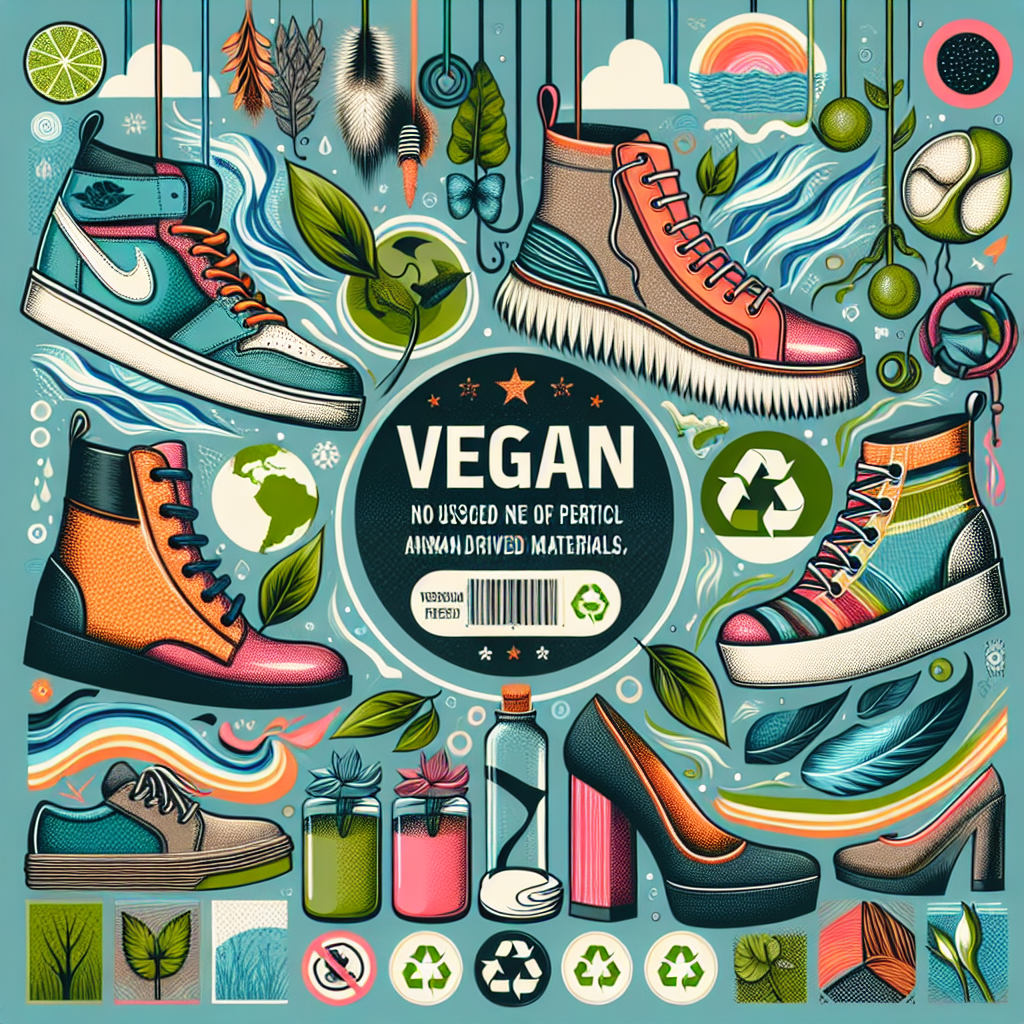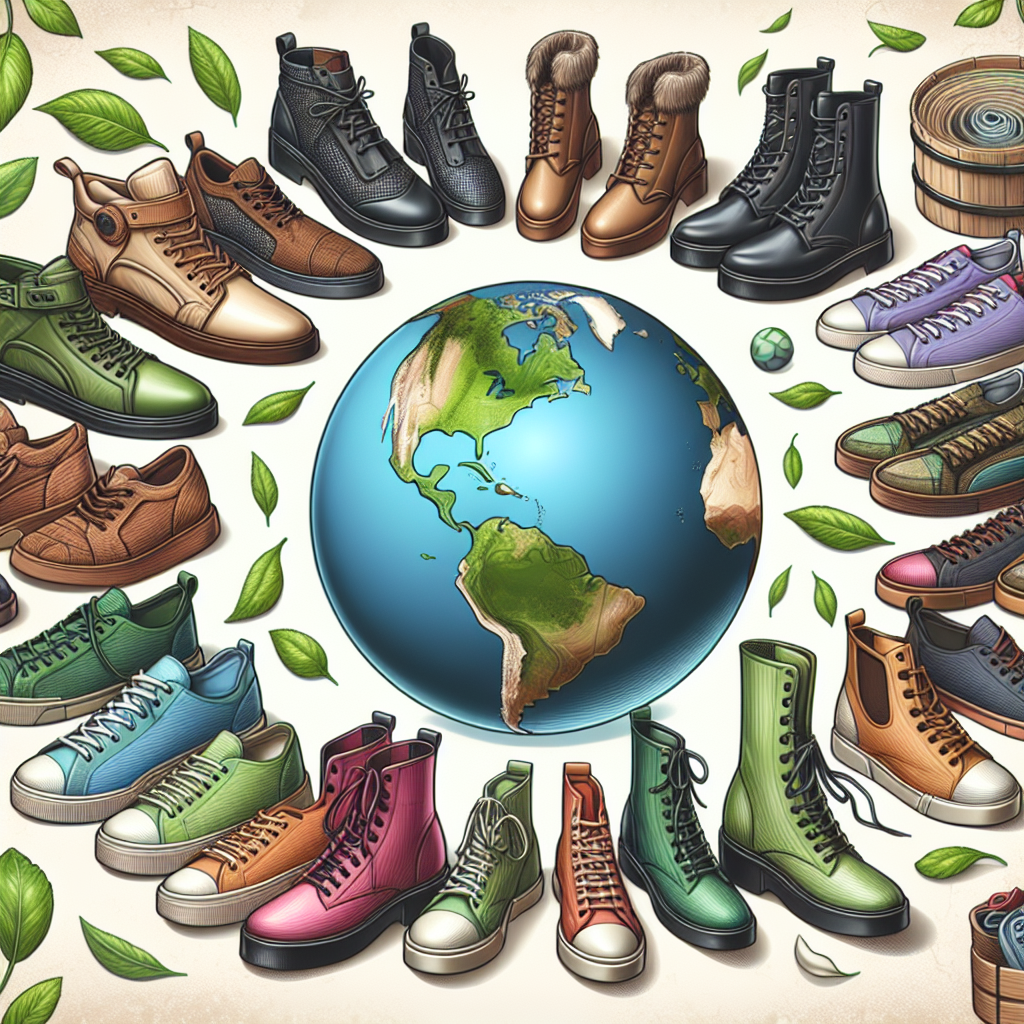Vegan Shoes: Introduction
Hey, fellow shoe lovers! We have something exciting lined up for you – vegan shoes! Now, we know what you might be thinking – what exactly are vegan shoes and why should we care? Well, vegan shoes are not just your ordinary footwear; they are a sustainable and compassionate option that leaves a smaller carbon footprint. In this article, we’ll explore the world of vegan shoes, from how they are made to the benefits they offer for both you and the environment. So get ready to step into a world of fashion that’s kind to our planet and all its inhabitants!

What are vegan shoes?
Vegan shoes are footwear that is made without the use of any animal-derived materials or byproducts. Unlike traditional shoes, which often use materials like leather, suede, or wool, vegan shoes are cruelty-free and do not harm animals in their production. They are a sustainable and ethical alternative for those who follow a vegan lifestyle or simply wish to make more conscious fashion choices.
Definition of vegan shoes
Vegan shoes are defined by their exclusion of animal-based materials such as leather, fur, silk, or animal-derived glues. Instead, they are made from various plant-based materials, including synthetic leathers, hemp, cork, and recycled materials. These non-animal alternatives replicate the look and feel of traditional materials while remaining free from animal exploitation.
Materials used in vegan shoes
Vegan shoes utilize a range of alternative materials that mimic the look, feel, and durability of animal-based materials. Some popular materials used in vegan shoes include:
- Synthetic leather: Also known as vegan leather or faux leather, this material is typically made from polyurethane or polyvinyl chloride. Synthetic leather can closely resemble genuine leather in appearance and durability.
- Hemp: Derived from the fibers of the cannabis plant, hemp is a versatile and sustainable material. It is known for being strong, breathable, and resistant to mold and mildew.
- Cork: Harvested from the bark of cork oak trees, cork is a sustainable and durable material commonly used in the soles of vegan shoes. It is lightweight, water-resistant, and has natural shock-absorbing properties.
- Recycled materials: Many vegan shoe brands strive to reduce waste by incorporating recycled materials into their designs. This can include recycled plastics, fabrics, and rubber.
Advantages of wearing vegan shoes
Wearing vegan shoes offers numerous advantages, both for individuals and the planet. Some key benefits include:
- Ethical and cruelty-free: By choosing vegan shoes, you can actively contribute to reducing animal suffering and exploitation. No animals are harmed or killed in the production of vegan shoes, making them a compassionate choice for animal lovers.
- Sustainability: Vegan shoes are generally more environmentally friendly compared to traditional shoes made from animal-based materials. The production of vegan shoes requires fewer resources, such as water and land, and generates less waste and pollution.
- Versatility and style: Vegan shoes have come a long way in terms of design and aesthetics. There is now a wide range of stylish and trendy options available, catering to various tastes and fashion preferences. Vegan shoes are no longer limited to a specific style or look – you can find vegan sneakers, sandals, boots, and even high heels.
- Allergen-free: Traditional leather shoes can cause allergic reactions for those sensitive to animal proteins. Vegan shoes, made from synthetic materials, eliminate this risk, making them a safer and more comfortable choice for individuals with allergies.
- Highly durable: Vegan shoes are known for their durability and longevity. Synthetic leathers used in vegan shoes are often more resistant to wear and tear compared to genuine leather, resulting in shoes that can withstand everyday use and last longer.
Popular vegan shoe brands
As the demand for vegan shoes continues to grow, numerous brands have emerged with a commitment to cruelty-free and eco-friendly footwear. Here are three popular vegan shoe brands worth exploring:
- Dr. Martens (Vegan Line): Known for their iconic boots, Dr. Martens offers a vegan line that maintains the brand’s classic style and durability without using any animal products. These vegan boots are made with synthetic materials that mimic leather.
- Veja: Veja is a French brand that has gained popularity for its eco-friendly and vegan sneakers. They use a variety of sustainable materials, including organic cotton, recycled polyester, and a leather-like material made from corn waste.
- TOMS (Vegan Styles): TOMS is widely recognized for its comfortable shoes and social responsibility initiatives. They offer a range of vegan styles made without animal products, using materials like canvas and plant-dyed fabrics.
- Will’s Vegan Shoes: This UK-based brand is dedicated entirely to producing vegan footwear. They offer a wide range of styles, from dress shoes to boots, all made with ethical and environmentally friendly materials.
Types of vegan shoes
Vegan shoes come in various styles to suit different occasions and preferences. Here are three common types of vegan shoes:
Vegan sneakers
Vegan sneakers are a versatile and popular choice for everyday wear. They offer comfort, style, and functionality without compromising your values. Vegan sneaker brands often prioritize sustainability and use recycled materials, organic cotton, or hemp in their designs. Whether you’re going for a casual or sporty look, vegan sneakers are a great addition to any wardrobe.
Vegan sandals
Vegan sandals are perfect for warmer weather or occasions that call for open-toed shoes. They are available in a wide range of styles, including flat sandals, wedges, and gladiator sandals. Vegan sandal brands prioritize materials such as cork, organic cotton, and hemp for their breathability and comfort. These cruelty-free options allow you to enjoy the sun and showcase your style while supporting ethical fashion.
Vegan boots
Vegan boots are a must-have for colder seasons or for those wanting a more edgy and durable footwear option. They come in various styles, including ankle boots, knee-high boots, and combat boots. Vegan boot brands often use synthetic leathers, microfiber, or recycled materials to create stylish and long-lasting boots. These cruelty-free boots are not only fashionable but also eco-friendly alternatives to traditional leather boots.
Choosing the right vegan shoes
When shopping for vegan shoes, there are several factors to consider to ensure you find the perfect pair. Here’s what you should keep in mind:
Understanding different vegan shoe labels
Vegan shoes may carry various labels and certifications that indicate their cruelty-free and sustainable attributes. Look out for labels such as “PETA-approved vegan” or “vegan certified” to ensure the shoes meet specific standards. These labels provide reassurance that the shoes are made without using any animal-derived materials and have undergone ethical manufacturing processes.
Evaluating the ethical practices of the brand
Research the brand’s commitment to ethical practices and sustainability. Look for information on their website about their materials sourcing, manufacturing processes, and labor conditions. Brands that prioritize fair trade practices, use sustainable materials, and prioritize workers’ well-being demonstrate a commitment to ethical fashion.
Considering comfort and fit
Comfort and fit are essential factors to consider when choosing any type of shoe. Vegan shoes are available in various sizes, widths, and styles, so it’s important to find a pair that suits your feet comfortably. Look for brands that offer detailed size charts and customer reviews to ensure you make an informed decision. Consider any specific foot conditions or requirements you may have and opt for shoes that provide adequate support and cushioning.

Care and maintenance of vegan shoes
Proper care and maintenance can help extend the lifespan of your vegan shoes and keep them looking great. Here’s how to care for different types of vegan shoes:
Cleaning vegan leather shoes
To clean vegan leather shoes, start by wiping them with a damp cloth to remove any surface dirt or debris. Next, create a mixture of mild soap and warm water. Use a soft-bristle brush or cloth to gently scrub the shoes, paying attention to any areas with stains or marks. After cleaning, wipe the shoes with a clean, damp cloth to remove any soap residue. Allow them to air dry away from direct sunlight or heat sources.
Caring for vegan suede shoes
For vegan suede shoes, begin by using a suede brush or soft cloth to gently remove any surface dirt or dust. If there are stains, use a specialized suede cleaner or a mixture of water and white vinegar on a clean cloth. Gently rub the affected area with the cloth, being careful not to saturate the material. Allow the shoes to air dry naturally, and once dry, use a suede brush to restore the soft texture.
Storing vegan shoes properly
To maintain the shape and condition of your vegan shoes when not in use, it’s important to store them properly. Avoid placing heavy objects on top of them or storing them in cramped spaces that may cause the shoes to lose their shape. Insert shoe trees or crumpled paper to help retain their shape and absorb any moisture. Store them in a cool, dry place away from direct sunlight to prevent fading or discoloration.
Comparing vegan shoes to traditional shoes
Vegan shoes differ from traditional shoes in several ways, ranging from the materials used to their impact on the environment and animal welfare. Here’s a comparison to highlight some key differences:
Differences in materials
Traditional shoes often rely on animal-based materials like leather, suede, or fur, whereas vegan shoes utilize synthetic materials, recycled fabrics, and plant-based alternatives. Vegan shoes are designed to replicate the look, feel, and functionality of traditional materials without the need for animal exploitation.
Environmental impact
The production of traditional leather involves extensive resource consumption, such as water, land, and chemicals. In contrast, vegan shoes generally have a lower environmental impact as they require fewer resources and produce fewer greenhouse gas emissions. Many vegan shoe brands also prioritize sustainable and recycled materials, reducing waste and promoting circular fashion.
Animal welfare considerations
Traditional shoes made from animal-derived materials contribute to the suffering and exploitation of animals in various industries. Through choosing vegan shoes, individuals can actively support animal welfare by refusing to be a part of these harmful practices. Vegan shoes offer a compassionate alternative that allows individuals to express their personal style without compromising their ethical values.

Addressing common misconceptions about vegan shoes
Despite their growing popularity, there are still some misconceptions surrounding vegan shoes. Let’s address and debunk a few common misconceptions:
Vegan shoes are not durable
One common misconception is that vegan shoes are not as durable as their leather counterparts. However, advancements in manufacturing technology have allowed vegan shoe brands to create high-quality, long-lasting footwear. Many vegan shoes are designed to withstand everyday wear and tear, making them just as durable as traditional shoes.
There are limited style options for vegan shoes
In the past, vegan shoes may have had a limited range of styles, which gave rise to the misconception that they lacked diversity. However, the demand for vegan shoes has significantly increased, leading to a wide variety of styles now available. Whether you’re looking for casual sneakers, elegant heels, or sturdy boots, there are plenty of options to suit every taste.
Vegan shoes are more expensive
While it’s true that some vegan shoes may have a higher price point due to the use of quality materials and ethical manufacturing practices, this is not always the case. With the growing demand for vegan options, more affordable vegan shoe brands have entered the market. Additionally, investing in durable vegan shoes can save money in the long run, as they tend to last longer than cheaper, less sustainable alternatives.
The rise of veganism and its impact on the shoe industry
The increased awareness and advocacy for vegetarianism and veganism have had a profound impact on various industries, including fashion and footwear. Here’s how the rise of veganism has influenced the shoe industry:
Growing demand for cruelty-free products
As more people adopt vegan lifestyles and place greater emphasis on ethical consumerism, the demand for cruelty-free products, including vegan shoes, has surged. This shift in consumer preferences has prompted more companies to offer vegan options and spurred the development of innovative and sustainable materials.
Influence on traditional shoe manufacturers
The rise of veganism has also influenced traditional shoe manufacturers, many of whom have started incorporating vegan options into their product lines. This shift reflects the changing consumer landscape and the recognition that ethical and sustainable fashion is not just a passing trend but a long-term shift in consumer behavior.
The future of vegan shoes
The future of vegan shoes looks promising as the market continues to grow and evolve. With advancements in material technology and increased awareness of sustainability and animal welfare, vegan shoes are poised to become the norm rather than the exception. As fashion-conscious consumers become more environmentally and socially conscious, the demand for cruelty-free and sustainable shoes will continue to rise.

Celebrities and influencers promoting vegan shoes
Celebrities and influencers play a significant role in influencing fashion trends and consumer choices. Many notable figures have embraced and promoted vegan shoes, amplifying their popularity and appeal. Here are several ways celebrities and influencers have been involved:
Celebrity endorsements
Celebrities have been instrumental in endorsing and promoting vegan shoe brands. Many well-known actors, musicians, and athletes have publicly shown their support for vegan footwear, either by collaborating with vegan brands, wearing vegan shoes at events, or advocating for cruelty-free fashion. These endorsements help raise awareness and make vegan shoes more accessible and desirable.
Influencer collaborations
Influencers, particularly those with a focus on sustainability and veganism, have partnered with vegan shoe brands to create limited-edition collections or collaborations. These collaborations often generate buzz and attract a broader audience, making vegan shoes more mainstream and fashionable.
Social media impact
Social media platforms like Instagram and YouTube have provided a platform for influencers and celebrities to showcase their vegan shoe choices and promote their benefits. Through sharing their personal experiences and styles, these individuals have a significant impact on shaping trends and inspiring others to make conscious fashion choices.
Vegan Shoes: Conclusion
Vegan shoes have emerged as a sustainable, ethical, and fashionable alternative to traditional footwear. By choosing vegan shoes, individuals can make a positive impact on animal welfare, the environment, and their personal style. Let’s summarize some of the many benefits of vegan shoes:
- Environmental Impact: Vegan shoes are not just about avoiding animal products; they significantly reduce the environmental footprint. The production of traditional leather footwear often involves heavy water use, chemical tanning processes, and substantial carbon emissions. In contrast, vegan shoes utilize materials like synthetic leather, organic cotton, and recycled plastics, which have a lower environmental impact. This shift is particularly relevant in the context of global efforts to combat climate change and promote sustainability.
- Animal Welfare: A core principle of veganism is the ethical treatment of animals. By choosing vegan shoes, consumers reject the use of animal skins and products, thereby taking a stand against animal cruelty and exploitation in the fashion industry. This choice resonates with the increasing global awareness and concern for animal rights.
- Health Benefits: Some argue that vegan shoes, often made from breathable materials, offer better comfort and hygiene. Unlike traditional leather, many vegan materials allow for greater air circulation, reducing the likelihood of foot odors and fungal infections.
- Economic Aspects: The rising demand for vegan shoes is influencing market dynamics. It’s leading to more investment in research and development of sustainable materials, which can potentially lower costs and improve the quality and durability of vegan footwear. This economic shift also supports smaller businesses and startups focused on ethical fashion, contributing to a more diverse and innovative market.
- Fashion and Style: Vegan shoes are no longer limited in style or quality. They are now available in a myriad of designs, from casual to high-end fashion, catering to a wide demographic. This inclusivity challenges the stereotype that ethical fashion lacks variety or aesthetic appeal.
- Cultural Shift: The popularity of vegan shoes reflects a broader cultural shift towards ethical consumerism. People are increasingly considering the ethical implications of their purchases, seeking products that align with their values of compassion, sustainability, and social responsibility.
- Future Trends: Looking forward, the vegan shoe industry is poised for further growth. Advances in technology and materials science promise more innovative and environmentally friendly products. As consumer awareness grows and attitudes shift, vegan shoes could become the standard rather than the exception in the footwear industry.
In conclusion, the choice of vegan shoes represents more than a fashion statement; it’s a reflection of a growing consciousness about our impact on the environment, animal welfare, and society. The evolution of this industry is an encouraging sign of how consumer choices can drive significant positive change.
With a wide range of brands, styles, and materials to choose from, there has never been a better time to embrace cruelty-free and eco-friendly fashion. The rise of veganism and its influence on the shoe industry is set to continue, paving the way for a future where conscious choices and compassion intertwine seamlessly. So, as you step into a world of ethical fashion, remember that every pair of vegan shoes is a step towards a more compassionate and sustainable future.





